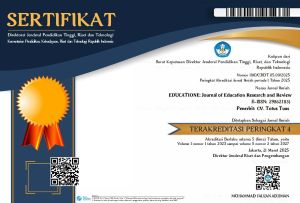THE ROLE OF SELF-ESTEEM IN SOCIAL MEDIA SELF-PRESENTATION AMONG EMERGING ADULTS: EDUCATIONAL IMPLICATIONS FROM INSTAGRAM USER BEHAVIOR
DOI:
https://doi.org/10.59397/edu.v3i2.86Keywords:
self-presentation, self-esteem, emerging-adulthood, instagramAbstract
This study aims to determine the effect of self-esteem on social media self-presentation in emerging adulthood Instagram users. The subjects of this study were men and women aged 18-25 years in Karawang Regency. The determination of the subjects was carried out using a non-probability sampling technique, especially convenience sampling, totaling 204 respondents. This study uses a quantitative method, the data collection technique in this study is using the Rosenberg Self Esteem Scale (RSES) to measure self-esteem and the Self Presentation on Facebook Questionnaire (SPFBQ) to measure self-presentation on social media. The data analysis technique used is simple regression. The results of this study show a p value = 0.447> 0.05, namely Ho is accepted and Ha is rejected, meaning that self-esteem does not have a significant effect on self-presentation. This finding indicates that self-presentation on Instagram in emerging adulthood is not influenced by self-esteem, but is likely influenced by other factors such as social pressure, peer influence, or motivation to form an ideal self-image. Therefore, further studies considering mediation or moderation variables are suggested to understand more comprehensively the relationship between self-esteem and self-presentation of social media users in this generation.
Downloads
Published
How to Cite
Issue
Section
Citation Check
License
Copyright (c) 2025 EDUCATIONE

This work is licensed under a Creative Commons Attribution 4.0 International License.



















